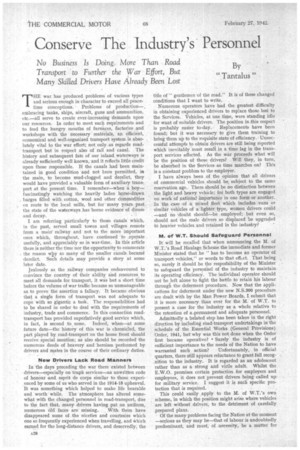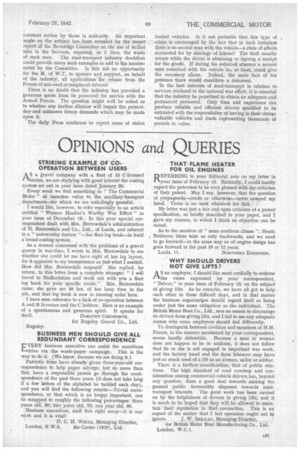Conserve The Industry's Personnel
Page 30

Page 33

If you've noticed an error in this article please click here to report it so we can fix it.
No Business Is Doing More Than Road Transport • to Further the War Effort, But Many Skilled Drivers Have Already Been Lost
By " Tantalus "
THE war has produced problems' of various types and serious enough in character to exceed all peacetime conceptions. Problems of production—. embracing tanks, ships, aircraft, guns and ammunition, etc.—all serve to create ever-increasing demands upon our resources. In order to meet such requirements and to feed the hungry mouths of furnaces, factories and workshops with the necessary ' materials, an efficient, economical and well-organized transport system is abso lutely vital to the war effort; not only regards roadtransport but in respect also of rail and canal. The history and subsequent fate of our inland waterways is already sufficiently well known, and it reflects little credit upon those responsible. If the canals had been maintained in good condition and not been permitted, in the main, to become mud-clogged and derelict, they would have provided a valuable form of auxiliary trans; port at the present time. I remember—when a boy— fascinatingly watching the heavily laden horse-drawn barges filled. with cotton, wool and other Commodities en route to the local mills, but for many years past the state of the waterways has borne evidence of disuse
and decay. .
I am referring particularly to those canals which, in the past, served small towns and villages remote from a main' railway and not to the more important ones which, throughout, have continued to operate usefully, and appreciably so in war-time. In this article there is neither the time nor the opportunity to enumerate the reason voty So many of the smaller canals .becamd derelict. Such details may provide a story at some later date. .
Jealously as the railway companies endeavoured to convince the country of their ability and resources, to meet all demands for transport, it was but a short time before the volume of war traffic became so unmanageable as to prove the assertion a fallacy. It became obvious that a single form of transport was not adequate to cope with so gigantic a task.. The responsibilities had to be shared in order to deal with the requirements of industry, trade and commerce. In this connection roadtransport has provided superlatively good service which, in fact, is second to none. Indeed, when—at some future date—the history of this war is chronicled, the part played by road-transport on the home front should receive special mention; as also should be recorded the numerous deeds of bravery and heroism performed by drivers and mates in the course of their ordinary duties.
New Drivers Lack Road Manners In the clays preceding the war there existed between drivers—especially on trill* services—an unwritten code of honour and esprit de corps similar to those experi, enced by some of us who served in the 1914-18 upheaval. It was something which helped to make life bearable and worth while. The 'atmosphere, has altered somewhat with the changed, personnel in road-transport, due to the fact that, many drivers having put on uniform, numerous old faces are missing. With them have disappeared some of the niceties and courtesies which one so frequently experienced when travelling, and Which earned for the long-distance drivers, and deservedly, the title of " gentlemen of the road." It is of these changed conditions that I want to write. .
Numerous operators have had the greatest difficulty in obtaining experienced drivers to replace those lost to the Services. Vehicles, at one time, were standing idle for want of suitable drivers. The position in this respect
is probably easier to-day. Replacements have been found; but it was necessary to give them training to bring them up to the requisite state of efficiency..Unsuccessful atfempfs to obtain drivers are still being reported which inevitably must result in a time lag in the transport services affected. As the war proceeds what will 'be the position of these drivers? Will they, in turn, be absorbed in the Services as time marches on? This is a constant problem to the employer.
I have always been of the _opinion that all drivers of commercial vehicles should be, subject to the same reservation age. There should be no distinction between the light and heavy vehicle; for both types are engaged on work of national importance in one form or another. In the case of a mixed fleet which includes vans or similar vehicles of a lighter type, women drivers could —and no -doubt should—be employed; but even so, should not the male drivers so displaced 'be upgraded te heavier vehicles and retained in the industry?
M. Of W.T. Should Safeguard Pergoonnel It will be recalled that when announcing the M. of W.T. 's Road Haulage Scheme the immediate and former Minister stated that he " has to become an operator of transport vehicles," or words to that effixt. That being so, surely it should be the resporfsibility of the Minister to safeguard the personnel of the industry to maintain its operating efficiency. The individual operator should not be left alone to fight the battle to retain his labour through the deferment procedure. Now that the applications for deferment under the new N.S.300 procedure are dealt with by the Man Power Boards, I submit that it is more necessary than ever for the M. of W.T. to present a case for the industry as a whole relative to the retention of a .permanent and adequate personnel.
Admittedly a. 'belated step has been taken in the right direction by including road-transport undertakings in the schedule of the Essential Works (General Provisions) Order, 1941, but' why was this not done when the Order first became operative? • Surely the industry is of sufficient importance to the needs of the Nation to have warranted such action? Unfortunately, in official quarters, there still appears reluctance to grant full recognition to the industry. It is regarded as an adolescent rather than as a strong and virile adult. Whilst the E.W.O. promises certain protection for employers and employees, it does not prevent drivers being called up. for military service. I suggest it is such specific protection that is required.
This could easily _apply to the M. of W.T.'s own scheme, in which the position might arise where vehicles are left without drivers, to the detriment of carefully prepared plans.
Of the many problems facing the Nation at the moment —serious as they may be—that of labour is undoubtedly predominant, and must, of necessity, be a matter for constant review by those in authority. An important angle on the subject has beon revealed by the recent report of the Beveridge Committee on the use of skilled men in the Services, exposing, as it does, the waste of such men. The road-transport industry doubtless could provide many such examples to add to the number noted by the Committee. Is this not an opportunity for the M. of W.T. to sponsor and support, on behalf of the industry, all applications 'kr release from the Forces °lads-used or:misplaced drivers?
There is no doubt that the industry has provided a generous quota from its personnel for service with the Armed Forces. The question might well be asked as to whether any further dilution will impair the presentday and unknown future demands which may be made -upon it.
The daily Press continues to report cases of stolen loaded vehicles. Is it not probable that this type of crime is encouraged by the fact that in such instances there is no second man with the vehicle—a state of affairs accounted for by shortage of labour? The theft usually occurs while the driver is obtaining or signing a' receipt for the goods. If during his enforced absence a second man remained with the vehicle he, at least, could give the necessary alarm. Indeed, the mere fact of his presence there would constitute a deterrent.
In the best interests of Boad-transpo,rt in relation to services rendered to the national war effort, it is essential that the industry be permitted to obtain an adequate and permanent personnel. Only time and experience can produce reliable and efficient drivers qualified to be 'entrusted with the responsibility of haying in their charge valuable vehicles and loads representing thousands of pounds in value.




















































